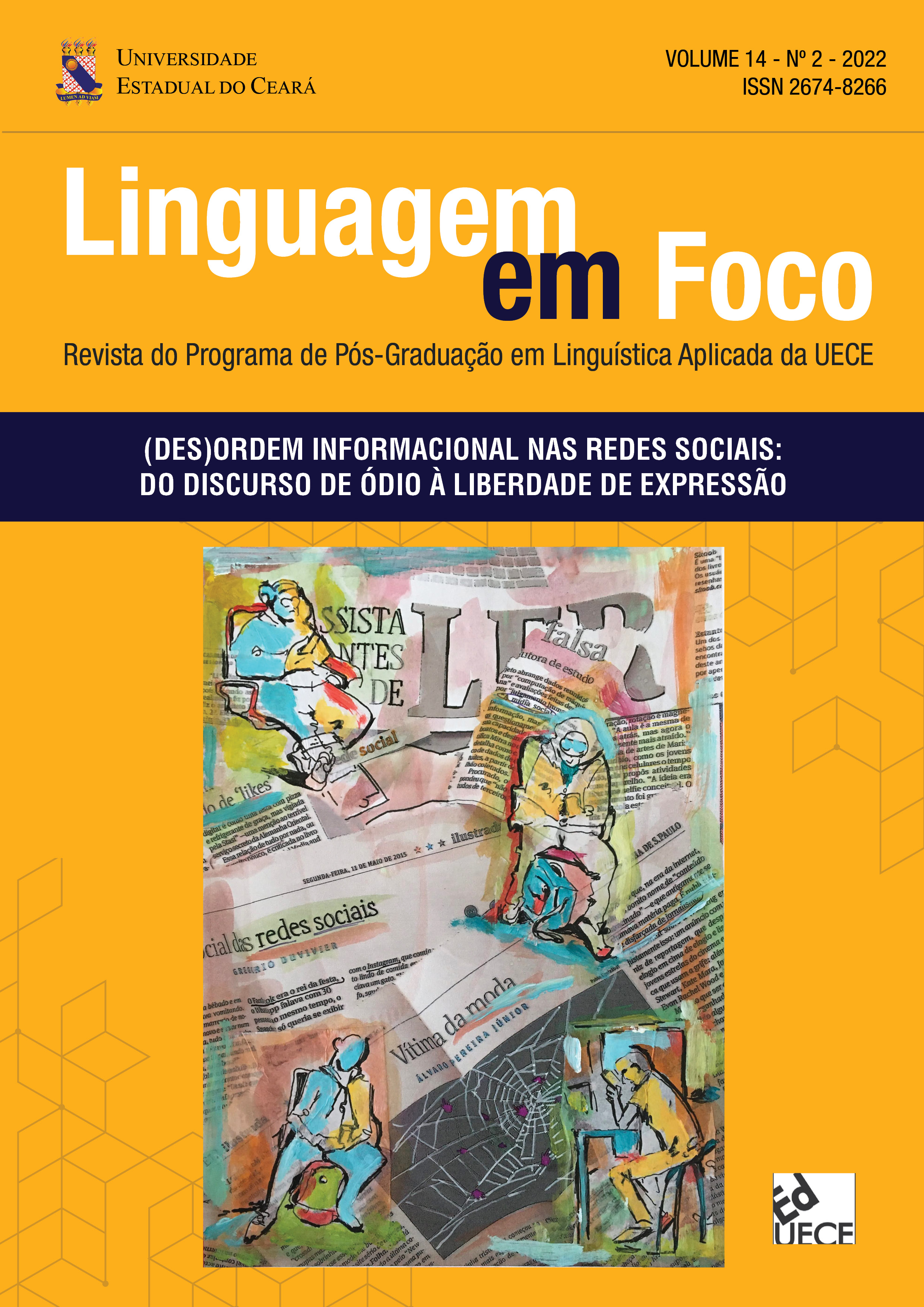Uma análise bakhtiniana sobre o discurso de ódio contra nordestinos em postagens nas redes sociais após o primeiro turno das Eleições 2022
DOI:
https://doi.org/10.46230/2674-8266-14-9350Palavras-chave:
Discurso de ódio, Nordestinos, XenofobiaResumo
A banalização do ódio e o ataque a grupos historicamente subalternizados vêm gerando uma onda de retrocessos sociais e democráticos marcada pela violência e pela prática da intolerância. Nessa perspectiva, objetiva-se analisar o discurso de ódio contra nordestinos em enunciados do universo das redes sociais digitais. Para isso, tomamos como base teórico-metodológica pressupostos da Análise Dialógica do Discurso, mais especificamente as noções de cronotopo, de enunciado concreto e de apreciação valorativa, considerando-se que, a partir de uma perspectiva axiológica, constroem-se, nas redes sociais, cronotopos de ódio que favorecem a disseminação de práticas discursivas intolerantes, preconceituosas e xenofóbicas. O corpus se constitui de cinco postagens que circularam nas redes sociais logo após o primeiro turno das eleições presidenciais 2022. Os resultados revelam que os enunciados analisados criam e são criados por cronotopos de ódio contra uma parcela da sociedade, que fortalecem a filiação ideológica e o sentimento de pertença de grupos apoiadores de Jair Bolsonaro em ambiente virtual. Além disso, esses enunciados contribuem para um projeto enunciativo que visa a inferiorização do povo nordestino e uma consequente marginalização dessa parte da população, de modo a tentar descredibilizar os resultados das eleições.
Downloads
Referências
BAKHTIN, M. (1950). Estética da Criação Verbal. Introdução e tradução do russo Paulo Bezerra. São Paulo: Martins Fontes, 2011.
BAKHTIN, M. Formas de tempo e de cronotopo no romance: ensaios de poética histórica. In: BAKHTIN, M. Questões de literatura e de estética: a teoria do romance. Trad. Aurora Fornoni Bernadini et al. São Paulo: Hucitec, 2014. p. 211-362.
BAKHTIN, M. Teoria do romance I: a estilística. Trad. prefácio, notas e glossário de Paulo Bezerra; organização da edição russa de Serguei Botcharov e Vadim Kójinov. São Paulo: Editora 34, 2015. 256p.
BAKHTIN, M. Teorias do romance II: as formas do tempo e do cronotopo. Trad. Paulo Bezerra. 1. ed. São Paulo: Editora 34, 2018.
BEMONG, N; BORGHART, P. A teoria bakhtiniana do cronotopo literário: reflexões, aplicações, perspectivas. In.: Bakhtin e o cronotopo: reflexões, aplicações, perspectivas. Tradução de Oziris Borges Filho, et al. São Paulo: Parábola Editorial, 2015. p. 16-32.
BRAIT, B. A natureza dialógica da linguagem: formas e graus de representação dessa dimensão constitutiva. In: BRAIT, B. (Org.). Bakhtin: dialogismo e construção do sentido. Campinas, SP: Unicamp, 2005. p. 69-92.
DROIT, R. Tolerância: O que é? Por que é importante? É possível nos dias de hoje? Como educar para a tolerância? Trad. Patricia Reuillard. São Paulo: Editora Contexto, 2017.
HISSA, D. Desmediatização, infodemia e fake news na cultura digital. SCRIPTA, v. 25, n. 54, p. 40-67, 2º quadrimestre de 2021.
HOLQUIST, M. A fuga do cronotopo. In: Bakhtin e o cronotopo: reflexões, aplicações, perspectivas. Trad. Oziris Borges Filho, et al. São Paulo: Parábola Editorial, 2015. p. 34-51.
MORSON, G. S. O cronotopo da humanicidade: Bakhtin e Dostoievski. In: Bakhtin e o cronotopo: reflexões, aplicações, perspectivas. Trad. Oziris Borges Filho, et al. São Paulo: Parábola Editorial, 2015. p. 118-139.
PIETRO, E. de; SANTOS, T. S.; MENA, T. O cenário político brasileiro e as disputas de hegemonia nos planos ideológico e discursivo. SCRIPTA, v. 25, n. 54, p. 129-157, 2º quadrimestre de 2021.
VOLOCHINOV. Marxismo e Filosofia da Linguagem: problemas fundamentais do método sociológico na ciência da linguagem. Trad. Michel Lahud e Yara Frateschi Vieira, com a colaboração de Lúcia Teixeira Wisnik e Carlos Henrique D. Chagas Cruz. 8. ed. São Paulo: Hucitec, 2017.
Publicado
Como Citar
Edição
Seção
Licença
Copyright (c) 2022 Samya Semião Freitas

Este trabalho está licenciado sob uma licença Creative Commons Attribution 4.0 International License.
Os autores que publicam na Linguagem em Foco concordam com os seguintes termos:
- Os autores mantêm os direitos autorais e concedem à revista o direito de primeira publicação. Os artigos estão simultaneamente licenciados sob a Creative Commons Attribution License que permite a partilha do trabalho com reconhecimento da sua autoria e da publicação inicial nesta revista.
- Os conceitos emitidos em artigos assinados são de absoluta e exclusiva responsabilidade de seus autores. Para tanto, solicitamos uma Declaração de Direito Autoral, que deve ser submetido junto ao manuscrito como Documento Suplementar.
- Os autores têm autorização para disponibilizar a versão do texto publicada na Linguagem em Foco em repositórios institucionais ou outras plataformas de distribuição de trabalhos acadêmicos (ex. ResearchGate, Academia.edu).





























